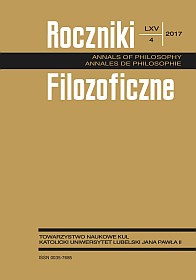Thomas Aquinas and Duns Scotus on Contingency, Freedom and Individuation
Abstract
The paper attempts to present the fundamental perspectives which are necessary to understand Aquinas’s position on contingency, freedom and individuation in order to compare his thinking with Duns Scotus’s. The author wants to take into account Gilson’s warning: it is useless to compare chosen details of the aforementioned philosophical proposals, if there is no understanding of the deep difference between the metaphysical systems of the two philosophers.
The first section presents the difference in the understanding of the relationship between nature and will. Duns Scotus interprets the will as opposed to nature and sees a truly free and Christian person acting as opposed to the deterministic operations of nature. For Aquinas the truly personal acting may be inscribed in nature as its free fulfilment. The difference is based on the different readings of Aristotle’s philosophy. The second section describes the difference in the understanding of the transcendence of the divine actions. Thomas uses a very strong concept of transcendence that allows him to accept the thesis that God’s immutable (= necessary) will achieves its purposes through the necessary and free (sic!) actions of the creatures (cf. De veritate, q. 6, a. 3, ad 3). Duns Scotus looks for a more intuitive understanding of the relationship between divine and human acting. Because of that he describes the divine actions as contingent, undertaken in the eternal “now”. The third section deals with the doctrine of individuation. Duns Scotus’s proposed solution to this problem is his famous form haecceitas. Although the form as the source of substantiality is the sign of individuality for Thomas, as well, in his case this has been achieved through individuation, and although he must have been aware of some difficulties in the classical Aristotelian position (matter as the main factor in individuation), he sticks to the Aristotelian solution, only slightly reformulating it (materia quantitate signata). There are two reasons for his fidelity to Aristotle in spite of doubts expressed by Albert the Great and Bonaventure: the stress on the hylemorphic structure of being and the attempt to articulate the consistency of the conceptual genera. The last problem leads to the main metaphysical difference of the analysed proposals. Duns Scotus as an essentialist has to inscribe everything that is real within the order of essence; Thomas articulates reality by taking into account essence and existence. His position opens wider possibilities for the understanding of being.
References
Auer, Johann. Die Entwicklung der Gnadenlehre in der Hochscholastik. T. 1–2. Freiburg: Herder, 1942–1951.
Benedykt XVI. „Przemówienie na uniwersytecie w Ratyzbonie (Regensburg)”, 12.09.2006. Opoka.org.pl. Dostęp 31.03.2017. http://www.opoka.org.pl/biblioteka/W/WP/benedykt_xvi/podroze/ben16-ratyzbona_12092006.html
Bonino, Serge-Thomas. „Les différentes réalisations de la science divine selon saint Thomas d’Aquin”. W: Thomas d’Aquin. De la Vérité, question 2 (La science en Dieu), 580–585. Fribourg–Paris: Éditions Universitaires–Cerf.
Dionysiaca. Recueil donnant l’ensemble des traductions latines des ouvrages attribués au Denys de l’Aréopage. Red. Philippe Chevalier. T. 1–2. Bruges: Desclée de Brouver, 1937.
Gilson, Étienne. Jean Duns Scot. Introduction à ses positions fondamentales. Paris: Vrin, 1952.
Gilson, Étienne. Duch filozofii średniowiecznej. Tłum. Jan Rybałt. Warszawa: IW PAX, 1958.
Hart, David B. The Experience of God. Being, consciousness, bliss. New Haven, London: Yale University Press, 2013.
Kim, Yul. Selbstbewegung des Willens bei Thomas von Aquin. Berlin: Akademie Verlag, 2007.
Klinger, Ingbert. Das Prinzip der Individuation bei Thomas von Aquin. Versuch einer Interpretion und Vergleich mit zwei umstrittenen Opuscula. Münsterschwarzach: Vier-Türme-Verlag, 1964.
Krąpiec, Mieczysław A. Realizm ludzkiego poznania, Poznań: Pallottinum, 1959.
Lottin, Otto. Psychologie et morale aux XIIe et XIIIe siècles. T. 1–5. Louvain, Gembloux: Abbaye du Mont César, J. Duculot, 1942–1960..
McGinn, Bernard. “The development of the thought of Thomas Aquinas on the reconciliation of divine providence and contingent action”. The Thomist, 39 (1975): 741–752.
Paluch, Michał “Recovering a Doctrine of Providence: A Report”. Nova et Vetera. English Edition, 12 (. 2014): 1161–1174.
Paluch, Michał. „Czy Akwinata stał się woluntarystą? Kilka obserwacji na temat wciąż niezakończonego sporu”. Przegląd Tomistyczny, 22 (2016): 313–329.
Pannenberg, Wolfhart. Die Prädestinationslehre des Duns Skotus im Zusammenhang der scholastischen Lehrentwicklung. Göttingen: Vandenhoeck und Ruprecht, 1954.
Pieper, Josef. „Prawda i niepoznawalność. Element negatywny w filozofii św. Tomasza z Akwinu”, Znak 13 (1961.): 1500–1514.
Swieżawski, Stefan. „Wstęp do kwestii 76”. W: Tomasz z Akwinu. Traktat o człowieku. Summa teologii I, 75–89, 57–83. Kęty: Wydawnictwo Antyk, 1988.
Te Velde, Rudi. „Natura In Seipsa Recurva Est: Duns Scotus and Aquinas on the Relationship between Nature and Will”. W: John Duns Scotus. Renewal of Philosophy. Acts of the Third Symposium Organized by the Dutch Society for Medieval Philosophy Medium Aevum (May 23 and 24, 1996). Red. Egbert P. Bos, 155–169. Amsterdam, Atlanta, GA: Rodopi, 1998.
Thomas de Aquino. Quaestiones disputatae de veritate. W: Opera omnia iussu Leonis XIII P.M. edita. T. 22, 1–3. Roma: Editori di San Tommaso, 1970–1976.
Tomasz z Akwinu. Kwestie dyskutowane o prawdzie. T. 1–2. Tłum. Adam Aduszkiewicz, Leszek Kuczyński i Jacek Ruszczyński. Kęty: Wydawnictwo Antyk, 1998.
Tomasz z Akwinu. Byt i istota. Kęty: Wydawnictwo Marek Derewiecki, 2009.
Copyright (c) 2017 Roczniki Filozoficzne

This work is licensed under a Creative Commons Attribution-NonCommercial-NoDerivatives 4.0 International License.





